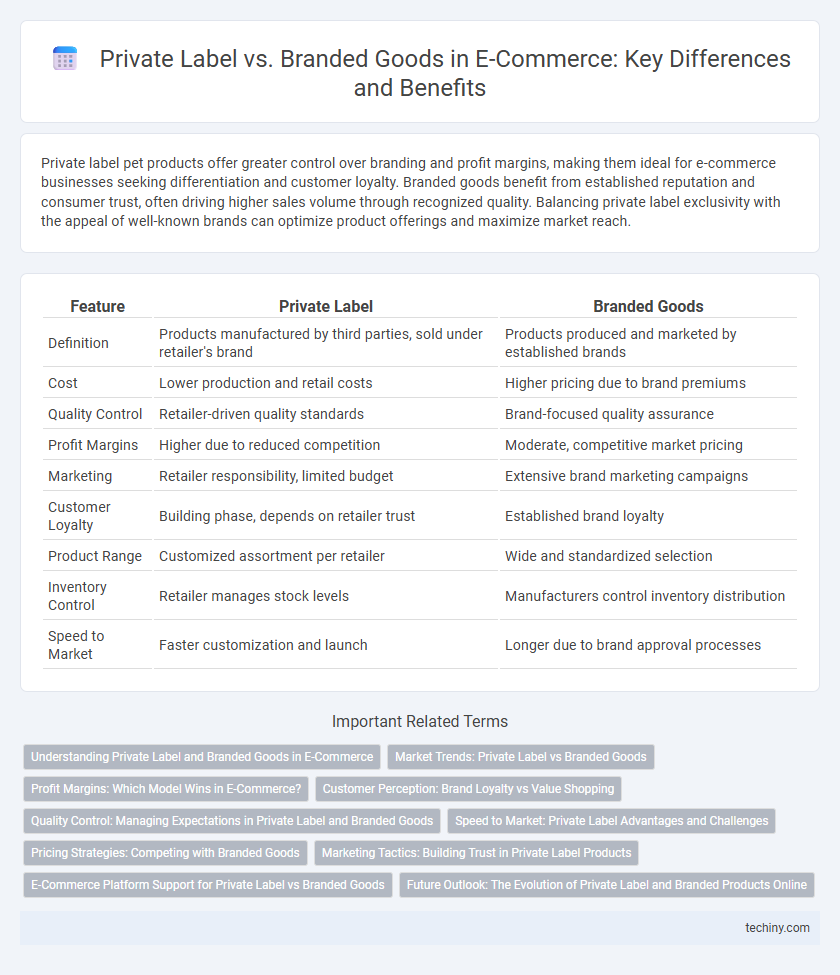Private label pet products offer greater control over branding and profit margins, making them ideal for e-commerce businesses seeking differentiation and customer loyalty. Branded goods benefit from established reputation and consumer trust, often driving higher sales volume through recognized quality. Balancing private label exclusivity with the appeal of well-known brands can optimize product offerings and maximize market reach.
Table of Comparison
| Feature | Private Label | Branded Goods |
|---|---|---|
| Definition | Products manufactured by third parties, sold under retailer's brand | Products produced and marketed by established brands |
| Cost | Lower production and retail costs | Higher pricing due to brand premiums |
| Quality Control | Retailer-driven quality standards | Brand-focused quality assurance |
| Profit Margins | Higher due to reduced competition | Moderate, competitive market pricing |
| Marketing | Retailer responsibility, limited budget | Extensive brand marketing campaigns |
| Customer Loyalty | Building phase, depends on retailer trust | Established brand loyalty |
| Product Range | Customized assortment per retailer | Wide and standardized selection |
| Inventory Control | Retailer manages stock levels | Manufacturers control inventory distribution |
| Speed to Market | Faster customization and launch | Longer due to brand approval processes |
Understanding Private Label and Branded Goods in E-Commerce
Private label products in e-commerce are manufactured by third parties and sold under a retailer's brand, offering higher profit margins and greater control over product features and pricing. Branded goods, created and marketed by established manufacturers, leverage brand recognition and consumer trust to drive sales but often come with lower profit margins for retailers. Understanding the distinct supply chain dynamics, marketing strategies, and consumer perceptions of private label versus branded goods is essential for e-commerce businesses optimizing inventory and maximizing profitability.
Market Trends: Private Label vs Branded Goods
Private label products have experienced significant market growth, capturing over 18% of retail sales worldwide due to increasing consumer demand for value and quality alternatives. Branded goods continue to dominate premium segments, leveraging strong brand loyalty and extensive marketing investments that maintain their market share despite rising competition. Market trends indicate a shift towards private label expansion in categories like groceries and personal care, driven by retailer strategies to enhance profit margins and consumer trust.
Profit Margins: Which Model Wins in E-Commerce?
Private label products typically offer higher profit margins in e-commerce due to lower manufacturing and marketing costs compared to branded goods, which often involve significant brand development and advertising expenses. Branded goods benefit from strong consumer recognition and trust, allowing premium pricing but often at the expense of slimmer margins. E-commerce sellers prioritizing profitability tend to favor private label models because they control pricing, production, and supply chain efficiencies more effectively.
Customer Perception: Brand Loyalty vs Value Shopping
Customer perception of private label products often centers on value shopping, as these goods provide cost-effective alternatives with comparable quality. Branded goods tend to generate stronger brand loyalty due to established reputation, consistent quality, and emotional connection with consumers. E-commerce platforms can leverage detailed product reviews and personalized recommendations to influence this dynamic, encouraging repeat purchases across both categories.
Quality Control: Managing Expectations in Private Label and Branded Goods
Quality control in private label products often requires rigorous supplier oversight to ensure consistent standards, as manufacturers may vary, impacting product reliability. Branded goods benefit from established quality assurance processes and brand reputation, reducing variability and enhancing customer trust. Effective quality management in private label e-commerce involves clear specification adherence, regular audits, and transparent communication to meet or exceed branded product expectations.
Speed to Market: Private Label Advantages and Challenges
Private label products enable faster speed to market by allowing retailers to quickly develop and launch customized items without lengthy brand approval processes. This agility helps capitalize on emerging trends and consumer demands more efficiently compared to established branded goods, which often undergo rigorous product development and marketing cycles. However, private labels face challenges in quality perception and brand recognition, which can impact initial consumer trust despite faster availability.
Pricing Strategies: Competing with Branded Goods
Private label products often leverage cost-effective manufacturing and streamlined supply chains to offer competitive pricing that undercuts branded goods, attracting price-sensitive consumers. Branded goods rely on brand equity and perceived quality to justify premium pricing, maintaining customer loyalty and margins. Strategic pricing for private labels involves balancing affordability with perceived value to capture market share without eroding overall category profitability.
Marketing Tactics: Building Trust in Private Label Products
Private label products use targeted storytelling and customer reviews to build trust and replicate the perceived quality of branded goods. Leveraging social proof through influencer partnerships and transparent product sourcing enhances credibility for private labels. Data-driven personalization in marketing campaigns increases consumer confidence and loyalty, narrowing the trust gap with established brands.
E-Commerce Platform Support for Private Label vs Branded Goods
E-commerce platforms offer robust support for private label products through customizable storefronts, inventory management tools, and direct supplier integrations, enabling sellers to maintain control over branding and pricing. In contrast, branded goods benefit from built-in customer trust and marketplace endorsements but often face stricter compliance and limited customization within platform frameworks. Advanced analytics on e-commerce platforms provide private label sellers with targeted marketing insights, while branded goods rely more on brand recognition and established customer loyalty to drive sales.
Future Outlook: The Evolution of Private Label and Branded Products Online
Private label products are poised to capture a growing share of online market space due to increasing consumer trust and improved quality perception. Advances in e-commerce technology and data analytics enable retailers to tailor private label offerings to specific customer preferences, enhancing competitiveness against established branded goods. Brand manufacturers are also evolving by integrating digital strategies, personalized marketing, and sustainability initiatives to maintain relevance in a rapidly shifting online retail landscape.
Private Label vs Branded Goods Infographic

 techiny.com
techiny.com